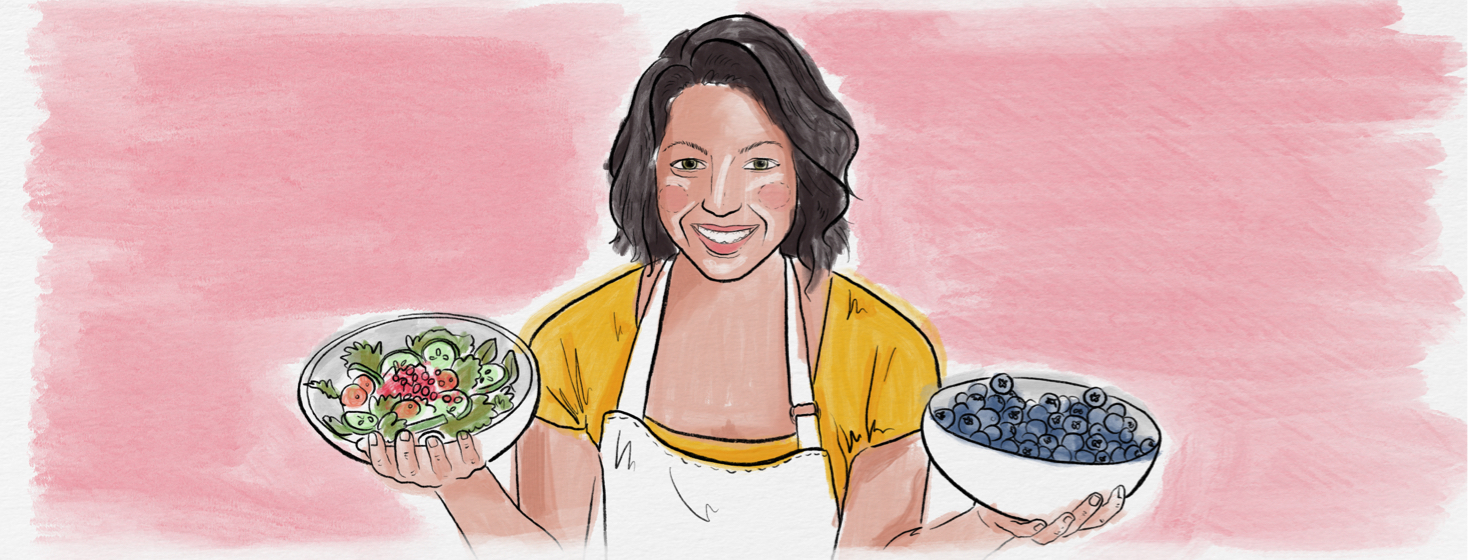Get to Know Jennifer Fugo: Clinical Nutritionist and Host of The Healthy Skin Show
Meet Jennifer Fugo, MS, CNS, LDN. I had the pleasure of connecting with Jennifer after the Eczema Expo. She shares her personal experience with eczema and how it led her to start The Healthy Skin Show - a podcast where she dives into the research behind alternative treatment options for skin conditions.

Jennifer's eczema story
When I was in grad school for my Master’s degree in Human Nutrition, I noticed these transparent bubbles that had formed under the skin of my right middle finger. At first, I didn’t think much of them, but with time, they became extremely itchy kicking off what would become my first ever flare of dyshidrotic eczema. With time, the rash that started on my finger spread to cover both palms and eventually messed up my nails due to the constant inflammation.
My hands were burning, itchy, and red
My palms would typically feel like they were on fire for most of the hot, humid months – burning, itchy and super red. But they’d dry out as the weather cooled to a point that every time I’d bend my fingers or move my hand to grab something, the skin would split open.
Disposable gloves became my daily companion to hopefully reduce how often I’d need to wash my hands because water alone burned so badly. Showering and washing my hair was honestly a nightmare!
Searching for solutions - down the Google rabbit hole
As for my experience with my dermatologist, I was told that this was something I’d probably have for life and offered topical steroids along with vaseline as a solution for reducing the extremely dry, fragile skin (even though it was an utterly impractical suggestion).
Because no hope was given to me that there was anything I could do beyond more serious medications, I dove deep down the Google rabbit hole seeking any tips or remedies that could help. I had been gluten, dairy and egg-free for six years when dyshidrotic eczema suddenly showed up so I wasn’t too keen on changing my diet any further.
I found healing and you can too!
It took about a year to get the flares to subside basically throwing everything at my skin that I could find. I must admit – many of the remedies I read about online and tried didn’t really help. And when I finally got to a stable place with my skin, I was constantly afraid that it would flare again for at least a year or so.
I’m grateful that I was able to heal dyshidrotic eczema, but I didn’t feel like I could just leave other people behind. This became my motivation which inspired me to work with people seeking alternative strategies (based on research) to resolve chronic skin rash issues and to launch the Healthy Skin Show podcast!
Why is diet a popular topic?
Diet (or more specifically elimination diets) are popular tools for people with chronic eczema (and other skin conditions) to use because it seems like the most accessible thing they can control once they get rid of potential environmental triggers/allergies.
Plus, there’s a lot of reinforcement to use this tool not only by people within online forums but also by many alternative practitioners. There are also published books that also promote diet changes aside from topical suggestions.
The other factor is that for people who feel like their skin rashes (and flares) are beyond their control, diet IS something you can control so even if it doesn’t really help all that much, the individual feels like they’re “doing something”.
Misconceptions about eczema and diet
As a clinical nutritionist, I’m all for improving diet quality and making changes that do improve nutrient density. But I firmly believe that diet is overused by practitioners and people thinking that removing foods is the only way that they’ll clear their skin. Yes, some people will see changes in their skin when they change their diet, but it might not actually be the food itself that prompts such a big improvement… as ultimately how food is digested, absorbed and interacts with the microbiome complicates things.
Diet is only part of what causes eczema
That’s why out of the sixteen root causes of eczema that I assess clients for in my virtual practice, diet is only ONE of the sixteen. And this explains why one person may experience a vastly different outcome than someone else by eliminating the exact same foods. In some instances, someone’s skin might not improve OR could actually get worse (which does happen!) by doing elimination diets.
Other root causes to consider in your case beyond diet include thyroid dysfunction, nutrient deficiencies, gut dysfunction, gut microbiome imbalances or hidden infections, immune system activation, environmental toxins (including mycotoxins produced by mold), autoimmunity, medication reactions, and genetics.
The dangers of elimination diets
Also, I do need to share that excessive eliminations have their own dangers including triggering IgE allergies to unnecessary eliminations, more reactivity to foods that were previously tolerated, nutrient deficiencies, reductions in healthy gut microbes, and even orthorexia and food fear. AND these elimination diets typically aren’t appropriate for people with a previous history of eating disorders.
That’s why I believe that if you don’t find improvement within 30 days of elimination, it warrants looking beyond food for other root causes that could be hidden factors in your case rather than continuing to eliminate more and more foods.
Eat a wide variety of foods
And in case you’re curious, you can absolutely eat a wide variety of foods (including reintroducing foods you’ve eliminated) and get improvements in your skin. I generally like to have clients eat a wide variety of food rather than eliminating foods – and still, our clients get great results. So if you’ve thought that diet was the only way to clear your skin, now you know that’s not true.
What is The Healthy Skin Show podcast?
The Healthy Skin Show podcast is a passion project for me that I started in 2019 as a way to share research-based and clinical insights that would be seen as “alternatives” to conventional medicine’s approach to eczema (and other chronic skin conditions). The podcast has nearly 260 episodes (as of the date of this interview) and can be found at www.HealthySkinShow.com or by searching for it on every podcast app available.
Her goal is to help people connect the dots
I want to help listeners understand complex issues that their doctor might not have the time to explain and have the confidence to ask better questions so they can advocate more effectively for themselves (or their loved ones). I share and connect the dots between more current research that hasn’t made it into textbooks or exam rooms yet so that you can potentially try options that your doctor might not be familiar with or are just outside of what they feel comfortable recommending.
Plus we share personal journeys as well to help listeners feel less alone. Honestly, I’m talking about anything and everything that I can find that helps my clients that you can bring back to your doctor or practitioner OR even potentially take action on yourself.
I believe we should have more options than what’s currently presented – especially if you’re not comfortable using medications or if you’d like to blend medications with alternative strategies.
Making educated choices about your treatment options
As for one last point, I believe it’s really important to make educated choices about your health and skin that aren’t rooted in shame or fear. Living with eczema can feel at times like a living hell… and it’s not helpful to be shamed into taking or not taking medication. Ultimately, deciding what’s best for you is up to you once you’ve asked many questions, read up on the options and considered your quality of life.
Medication and alternative strategies CAN work together
Should you choose to use medication on your journey, know that you can often still work on many other factors of your case and try alternative strategies simultaneously if this is important to you. So if you’ve previously thought that you could only do one or the other, know that you have many more options in front of you than you realize… even if diet changes aren’t helping or if you currently struggle with food fear.
Follow Jennifer on Instagram or by tuning into The Health Skin Show podcast!

Join the conversation